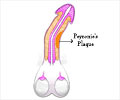Erectile dysfunction caused after the surgical removal of a cancerous prostate gland can be healed by a protein called sonic hedgehog, a new American study reveals.
The research, conducted by Northwestern University Feinberg School of Medicine, was presented at the recent American Urological Association 2010 Annual Meeting.Nearly 80 per cent of men who've undergone surgery to remove a cancerous prostate gland lose the ability to have an erection because of damage to a critical nerve that runs along the prostate.
But the research found that this damaged nerve could be regenerated more quickly with sonic hedgehog delivered via a nanofiber gel.
The study, done with rats, showed the protein regenerated the damaged nerve twice as fast as it would have regenerated on its own.
Speeding up the nerve healing is essential in order to prevent cell death in the penis and to preserve erectile function.
"This discovery about sonic hedgehog could be applicable not only to erectile dysfunction after prostate surgery but also when the cavernous nerve is damaged by diabetes, which also causes erectile dysfunction," said principal investigator Carol Podlasek, assistant professor of urology at Feinberg.
The sonic hedgehog is a vital building block in the body that promotes nerve regeneration and directs the activity of many other proteins in the body.
Podlasek, who is also a member of the Robert H. Lurie Comprehensive Cancer Center of Northwestern University, said: "There is a tremendous need for a therapy to treat erectile dysfunction caused by cavernous nerve damage."
Men's quality of life after prostate cancer surgery is of greater concern, she noted, because men are being diagnosed at a younger age and live longer due to improved cancer therapies.
Podlasek said: "The biggest concern for many men before they undergo surgery for prostate cancer is quality of life after surgery.
"It not only affects the men undergoing surgery but also their partners."
A recent survey of patients undergoing prostate cancer treatment showed that 45 percent of patients were most concerned with quality of life after surgery, 29 percent with extending their life and 13 percent with delaying disease progression.
Podlasek said: "So for patients with prostate cancer, being able to have an erection and lead a normal life after treatment is very important."
Nonsurgical treatments for erectile dysfunction are only effective in a minority of patients with cavernous nerve damage, she noted.
The new study findings may also apply to any damaged peripheral nerve, such as the sciatic nerve or facial nerve, that needs this protein to maintain its structure, Podlasek said.
Source-ANI






![Prostate Specific Antigen [PSA] Prostate Specific Antigen [PSA]](https://www.medindia.net/images/common/patientinfo/120_100/prostate-specific-antigen.jpg)








